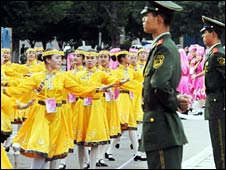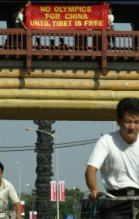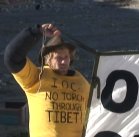Torch relay in Lhasa postponed again
 The Chinese authorities postponed the torch relay in Tibet again. It’s been hard to figure out exactly what the plan is now but it looks like the torch won’t go to Lhasa until this Saturday at the earliest.
The Chinese authorities postponed the torch relay in Tibet again. It’s been hard to figure out exactly what the plan is now but it looks like the torch won’t go to Lhasa until this Saturday at the earliest.
Human Rights Watch slammed the IOC and China for the plan to take the Olympic torch to Tibet calling it “unconscionable and reckless” and saying “if Tibet is open to the torch, it must also be open to an international investigation, the media, and anyone who wishes to know what actually happened in March.”
The torch did go into East Turkestan (Xinjiang) today. East Turkestan is another occupied territory of China where the Chinese government is brutally oppressing eight million muslim Uighur people under the guise of “fighting terrorism.” There, knowing that the local people resent Beijing’s rule and do not consider themselves Chinese, the authorities just straight up told the people not to come out and watch the torch pass. Instead they recommended that everyone ” watches on the television from home.”
Posted: June 16th, 2008 under News.
translate:
Comments: 7
Comments
Comment from tibet
Time: June 18, 2008, 5:23 am
Nonsense
Comment from rositta
Time: June 18, 2008, 6:34 pm
I am just watching your interview on CBC and was saddened to hear that you are receiving threats. It doesn’t matter if one agrees with you or not, your right to say it is paramount…ciao
Comment from Xiao Meng
Time: June 19, 2008, 3:19 am
Recent Findings from the Pew Research Center…..
http://news.yahoo.com/s/pew/20080619/ts_pew/43torturejustified
43% - Torture Justified
Thu Jun 19, 12:00 AM ET
More than four in ten Americans (43%) say that the use of torture can be justified to gain key information sometimes (31%) or often (12%), according to a 2007 Pew Research survey. However, a 54%-majority say torture is never (29%) or rarely (25%) justified. The number of Americans saying the use of torture against suspected terrorists is at least sometimes justified has been fairly stable since 2004, though the percentage saying torture can often be justified has dipped from 18% in October 2006. There have been consistent demographic and political differences in views about whether torture of suspected terrorists is ever justified. For instance, more African Americans than whites say the torture of suspected terrorists is never justified (37% vs. 28%). Older Americans also are more likely to rule out the use of torture than are younger people: 36% of those ages 65 and older say torture of suspected terrorists is never justified, compared with 25% of those ages 18-29.
GO AMERICA!! DEMOCRATIC LEADER OF THE WESTERN WORLD, LEADER OF HUMAN RIGHTS(?) AND FREEDOM!! SHOW THEM HOW IT’S DONE!! HOW TO “DEMOCRATICALLY” TREAT TERRORISTS ACCORDING TO WESTERN VALUES.
Comment from Tenzin
Time: June 19, 2008, 7:56 pm
I am not really surprised to hear that you are receiving threats given how nationalistic the Chinese are (and I want to add here that the Americans are the most nationalistic people on this earth. On CBC radio I heard a Canadian talking disdainfully about the “flag-waving patriotism” of America. On NPR a guest said that, “If we agree or not we[Americans] are a militaristic people.). But going back to what I was saying, I just hope that you are taking care of yourself and are aware of any threats. And also let me assure you that I am not any crazy stalker of yours. I think that it is just great that someone like you is doing such a good thing. And don’t forget that you are also an inspiration to a lot of Tibetans out there. There is a lack of leaders and leadership in the Tibetan community and there aren’t any people out there that people can look up to. I was just thinking a little while ago how Tibetan kids in India and elsewhere don’t have any real leaders to look up to (maybe they should think about Songtzen Gampo or something). I think that on the whole the Tibetan-movement (if there is such a think) is quite weak. And that just means that there is more opportuinity out there for Tibetans to do something good.
And the biggest blunder we (Tibetans) are making right now is that we are not really doing all we can. In a lot of cases, doing the right thing simply would mean sacrificing personal comfort. Just take for example all the qualified Tibetan people in America and Europe. We have benefitted from coming to the West. I think that the only thing that I got from coming to America is the English language. Had I lived in India, I would not be exposed to the English language to the extent I am here. And also coming to the US, you begin to realize that there is a bigger world out there. I sometimes feel like that the people in Dharamsala think that the Tibetan community is the whole world. Just like the story of the frogs that lived in a well and thought that the well was the entire universe. And the fact is that they cannot really help it. They are really not bombarded by international news like we are in America. And America can be really considered its own little universe.
But going back to what we can do, I think that we are not doing all that we can. I also think that if we did all that we can, it would be an altogether different ball game. Just think about all the human resource we have in the West. There are thousands of us out there, and not to forget, there are thousands who have benefitted from coming to the West who can do a lot of things to change the face of the Tibet-movement. Just think of all the qualified people in the West who can go and educate Tibetan kids in India. Just think of all the people out there who can go to Dharamsala and work (not necessarily in the Tibetan government) and make huge contributions. Just think if all the Tibetan people even did half or even quarter of what you are doing; it would mean a completely different Tibetan movement.
The fact of the matter is that there are a lot of good people out there who are not willing to do all they can. The biggest thing that is not working for us is the annual March 10 rally and other similar events. The March 10 rally is nothing but a feel-good self-congratulatory half-hearted event that does little in the way of producing any result.
I think we need to get the message albeit this late in the game that these intermittent protests and other similar actions will not do anything — just like they haven’t in the last several decades. What we need to do is make concrete contributions that will produce tangible results. And for someone who is looking to do something, there isn’t a dearth of things to do.
You can just about pick any topic and you can make contributions. Take for example movies. I think that we should be making movies that are a much higher calibre than the ones out there. And filmmakers, please also pay some attention to the story. And here is an example of how Tibetans in India live like frogs in a well. I think that we should be making movies that have some historical revelance or atleast some revelance with the Tibetan movement. But alas “The Cup” was about soccer. And “Dreaming Lhasa” was about the quest to find the rightful owner of an ornament. You get the gist. These should have been movies that have some relevency with the Tibet-issue, but they turn out to be human-interest stories. How about making a story set in Tibet in the 1950’s when the eastern half of Tibet was fighting the Chinese. Or maybe a story about the Cultural Revolution in Tibet. But it is quite possible that our filmmakers are still honing their skills, and are not able to handle complex issues. Let’s just that is the case.
Comment from Tenzin
Time: June 22, 2008, 8:25 pm
1. Perceived lack of leaders within the Tibetan community
There is a growing consciousness among Tibetans for the need of real leaders within the Tibetan community. The Tibetan woman who was interviewed on NPR, who is a member of the Tibetan parliament said that what we most urgently need is “political leaders” within the Tibetan community. But we already have a lot of leaders in the Tibetan community and most of them have worked for many decades in the Tibetan government. We already have leaders that are competent and educated, and who have a lot of experience regarding matters of Tibet. So why is there a feeling among the Tibetan people that we don’t have good leaders? For example, take a look at many of our cabinet ministers and you will see that there are a great many good people among them. When we already have leaders in the form of cabinet ministers and prime minister, then why do the Tibetans feel as if we need leaders in our community? Here, I will only talk about our cabinet ministers and prime minister, and I am not going to include other Tibetans currently not serving in the Tibetan government.
In the TGIE, we have a prime minister, several cabinet ministers, and general secretaries. These people who work in the TGIE are our real leaders, and if ordinary Tibetans feel that there is a lack of leadership, then that certainly means that somewhere our government-in-exile is not working so well, and that our leaders have not lived up to the expectations of the Tibetan people. Let me remind our leaders in the government that they solely do not exist to engage in “dialogue” with China, but they have a more pressing duty, which is to act as real leaders to the Tibetan people. I don’t know if I am correct in perceiving this but our leaders in the government are perceived as cold and distant figures within the Tibetan community. We want the prime minister, Samdong Rinpoche, and the rest of the cabinet ministers to step-off their pedestals, and freely interact with ordinary Tibetans. And we want them to act as real leaders to the Tibetan people, rather than act as if they solely exist to devise policies and engage in “dialogue” with China. Our ministers may feel good being in positions of power , but we want you to remember that with power comes responsibility. If our cabinet ministers fail to meet that responsibility, they will be held accountable for it, and they will be judged at the court of public opinion, and they will be pilloried for their shortcomings.
Our Prime Minister Samdong Rinpoche is said to be highly educated and very competent, I hope that he surely lives up to that hype. He has done a great many good deeds in the government, but let him not forget that he is the prime minister of the Tibetan people, and that he has the responsibility to lead the Tibetan people. I am sure that a great many Tibetan people who work with him get to see a lot of him, but let him also not forget that one of his duties is also to act as a leader of the Tibetan people. It is his duty to motivate the Tibetan people, and give the Tibetan people the perception that we have a genuine leader in him. The same goes for all our cabinet ministers; they should act as real leaders rather than appear to be involved in high-minded (or highbrow) politics. They should act like real leaders and reach out to the ordinary Tibetans, and be able to instill hope and motivation in their hearts.
The TGIE is only a proxy government, since it is not really the true government of Tibet. So, our government is not engaged in any real governance, because at the most, they have to govern the lives of 100,000 Tibetans living in India. They don’t have to deal with an economy, or defense, or infrastructure, or any such thing. The only things they really have to do are ensure that our children are getting a good education, and the people who work in the government are given a decent wage. They also take care of the Tibetan refugees crossing into Nepal from Tibet, and they may also have to take care of the elderly, the sick, etc etc. But they are forgetting one thing, and that is to provide genuine leadership to the Tibetan people. For some reason, our leaders act like they are somehow better than ordinary Tibetan people. They act like they should be respected, and they act like they are quite different from ordinary Tibetans. But whatever the reasons for their lack of leadership may be, ordinary Tibetans feel that they don’t have real leaders in the community.
2. Living in a world of our own
I said that we live oblivious to the outside world. And there is definitely a reason for that. It is globalization. Globalization has affected the rest of the world, but globalization has not reached our Tibetan communities in India. That is because we live in isolated areas in India, and also because we live in India. India has not been as nearly affected like China is by the effects of globalization. The Chinese understand globalization because they know that their products are sold in the West and around the world. China’s economy is also growing astronomically, and they understand that there is a bigger world out there. On the other hand, our Tibetan communities in India have no such contact with the outside world. We do no business with the West, and we do not have to think about the rate of growth of our economy. In other words, while China moves ahead and is an active player in globalization, our communities in exile are quite stuck rigidly in time. It is like as if time has stopped for our communities, because we are still living like we did 20 or 30 years ago. I am also trying to say that we have not been able to take advantage of globalization, and that is not very good. We need to perceive that there is a bigger world out there, but that is very difficult since we have very little dealings with the outside world.
I think this is quite bad for us. In 10 or 20 years, China will be much stronger and much more successful. We will come to a point in the not so distant future when we will be quite discouraged by the astronomical leaps China has made in its economy and living standards. We will think that it is quiet futile to fight with a country that is so big and so successful. We will really begin to see the stark differences between the upwards moving China and our own situation, which will not change much in the future. So, what are we to do to counteract an ever more prosperous China of the future? The answer is definitely not fighting them, but it is going to be a battle of wits. To quote a cliché, the pen will be prove mightier than the sword, in our case. We will have fighting a PR campaign with China in the future. Let me leave it there for now, because I cannot think what to write.
But I hope that it is a little more clear what I meant by living like frogs in a well.
3. More democratic China
I really don’t know what is going to happen, but the rate at which China is improving may actually be good for the Tibetan people, or atleast the fate of Tibet. Right now, there is so much censorship of information in China but will China be able to exercise such a control over information in the future. There will come a time when the Chinese people will know the history of Tibet and they will know that it was conquered by the PRC. I think Tibet will be free, if and when the Chinese agree that Tibet was illegally occupied. The thought that the Communist Party of China will be able to do in the future what is it doing right now is quite inconceivable.
Comment from Rich
Time: June 23, 2008, 4:34 pm
Tenzin, I think the important realization is that leadership does not mean telling other people what to do, but instead empowering those around you to make their voices heard. Likewise, democracy is not electing someone to represent the top officials’ decisions down to you, but instead electing someone to represent your opinions to top officials. Tibet has many great leaders, but if you look for them in government roles, you won’t find many. The real leaders are out and about in places where their work really makes a difference.
Comment from Tenzin
Time: June 24, 2008, 1:26 pm
I changed a few things and added a few things to my previous entry.
1. Perceived lack of leaders within the Tibetan community
There is a growing consciousness (from what I think) among Tibetans for the need of real leaders within the Tibetan community. The Tibetan woman who was interviewed on NPR, who is a member of the Tibetan parliament said that what we most urgently need is “political leaders” within the Tibetan community. I was also thinking that same that Tibetans don’t have any real leaders but we already have a lot of leaders in the Tibetan community, and most of them have worked for many decades in the Tibetan government. We already have leaders that are competent and educated, and who have a lot of experience regarding matters of Tibet. So why is there a feeling among the Tibetan people that we don’t have good leaders? For example, take a look at many of our cabinet ministers and you will see that there are a great many good people among them. When we already have leaders in the form of cabinet ministers and a prime minister, then why do the Tibetans feel as if we need leaders in our community? Here, I will only talk about our cabinet ministers and prime minister, and I am not going to include other Tibetans (like Mr. Jamyang Norbu) who are currently not serving in the Tibetan government.
In the TGIE, we have a prime minister, several cabinet ministers, and general secretaries. These people who work in the TGIE are our real leaders, and if ordinary Tibetans feel that there is a lack of leadership, then that certainly means that somewhere our government-in-exile is not working so well, and that our leaders have not lived up to the expectations of the Tibetan people. Let me remind our leaders in the government that they solely do not exist to engage in “dialogue” with China, but they have a more pressing duty, which is to act as real leaders to the Tibetan people. I don’t know if I am correct in perceiving this but our leaders in the government are perceived as cold and distant figures within the Tibetan community. We want the prime minister, Samdong Rinpoche, and the rest of the cabinet ministers to get-off their pedestals, and freely interact with ordinary Tibetans. And we want them to act as real leaders to the Tibetan people, rather than act as if they solely exist to devise policies within the TGIE and engage in “dialogue” with China. Our ministers may feel good being in positions of power, but we want them to remember that with power comes responsibility. If our cabinet ministers fail to meet that responsibility, they will be held accountable for it, and they will be judged at the court of public opinion, and they will be pilloried for their shortcomings.
Our Prime Minister Samdong Rinpoche is said to be highly educated and very competent, I hope that he surely lives up to that hype. He has done a great many good deeds in the government, but let him not forget that he is the prime minister of the Tibetan people, and that he has the responsibility to lead the Tibetan people. I am sure that a great many Tibetan people who work with him get to see a lot of him, but let him also not forget that one of his duties is also to act as a leader of the Tibetan people. It is his duty to motivate the Tibetan people, and give the Tibetan people the perception that we have a genuine leader in him. The same goes for all our cabinet ministers; they should act as real leaders rather than appear to be involved in high-minded (or highbrow) politics. They should act like real leaders and reach out to the ordinary Tibetans, and be able to instill hope and motivation in their hearts.
The TGIE is really a government in name since it is not really the true government of Tibet. So, our government is not engaged in any real governance, because at the most, they have to govern the lives of 100,000 or so Tibetans living in India. They don’t have to deal with an economy, or defense, or infrastructure, or any such thing. The only things they really have to do are ensure that our children are getting a good education, and the people who work in the government are given a decent wage. They also take care of the Tibetan refugees crossing into Nepal from Tibet, and they may also have to take care of the elderly, the sick, etc etc. But they are forgetting one thing, and that is to provide genuine leadership to the Tibetan people. For some reason, our leaders act like they are somehow better than ordinary Tibetan people. They act like they should be respected, and they act like they are quite different from ordinary Tibetans. But whatever the reasons for their lack of leadership may be, ordinary Tibetans feel that they don’t have real leaders in the community.
One reason why our Tibetan leaders in the TGIE don’t seem to motivate us and act like real leaders may actually have to do with China and trying to keep China happy. I don’t think that the TGIE really wants Tibetans shouting and protesting China, but rather they want Tibetans to live their lives peacefully in India and elsewhere while they engage China in some form of meaningful dialogue. Recently HH the Dalai Lama said, “I am a Chinese,” just to show that he has nothing against China and it people. The TGIE is deathly afraid to ruffle the feathers of China, and wants to appease to it, and not appear to China that it is an enemy of China. Most recently during the protests against the Torch-rally in America, I heard that Mr. Tashi Wongdu, who was a cabinet minister and now I think is in America representing the TGIE or something, called one of the organizers of the rally in Portland, Oregon, and told that under the instructions of Prime Minister Samdong Rinpoche Tibetans should not protest against the Torch. So the general consensus in the TGIE is that we need to work with China without making it mad against us. And all of this has to do with the topic at hand, which is an absence of leadership.
Our leaders in the TGIE are so afraid to anger China that they have given up on acting like genuine leaders. Because they have to talk with China, they can not risk motivating the Tibetan people and create a groundswell of resentment against China. The TGIE has already to deal with a faction of Tibetans who are in support of doing anything for Tibet including fighting China until their deaths. I think the TGIE is already quite aware of the steady rise of a sentiment among the Tibetans that who are no longer willing to wait and practice non-violence. So, what I am trying to say is that our leaders in the government do not want to incite and motivate the Tibetan people, which is exactly what ordinary Tibetans want. They in fact want leaders that will unify them in their fight against China, and that is really the last thing the TGIE wants.
2. Living in the past
The fact is that we have really not made any significant gains in the Tibet-issue. And Dharamsala is exactly the same now as it used to be some 20 or 30 years ago. There may be more motorcycles and cars on the road, and there may be more Western tourists in Dharamsala, but overall the situation has not changed much over the decades. We are still doing what we did in the past and we are still talking about the same things.
I said that we live oblivious to the outside world in my previous post just like frogs of a well. And there is definitely a reason for that. It is globalization. Globalization has affected the rest of the world, but globalization has not reached our Tibetan communities in India. That is because we live in isolated areas in India, and also because we live in India. India has not been as nearly affected like China is by the effects of globalization. The Chinese understand globalization because they know that their products are sold in the West and around the world. The Chinese understand globalization because in a little over a month they will be hosting the Olympics. China’s economy is also growing astronomically, and they understand that there is a bigger world out there. On the other hand, our Tibetan communities in India have no such contact with the outside world. In other words, while China moves ahead like a bullet-train and we are going no where. It is like as if time has stopped for our communities, because we are still living like we did 20 or 30 years ago. I am also trying to say that we have not been able to take advantage of globalization, and that is not very good.
I think this is quite bad for us. In 10 or 20 years, China will be much stronger and much more successful. We will come to a point in the not so distant future when we will be quite discouraged by the astronomical leaps China has made in its economy and living standards. We will think that it is quiet futile to fight with a country that is so big and so successful and so glittering. We will really begin to see the stark differences between the upwardly mobile China, and our own situation, which will not change much in the future. So, what are we to do to counteract an ever more prosperous China of the future? The answer is definitely not fighting them, but it is going to be a battle of wits. To quote a cliché, the pen is mightier than the sword. But I hope that it is a little more clear what I meant by living like frogs in a well.
3. More democratic China
I really don’t know what is going to happen, but the rate at which China is improving may actually be good for the Tibetan people, or at-least the fate of Tibet. Right now, there is so much censorship of information in China but will China be able to exercise such a control over information in the future. There will come a time when the Chinese people will know the history of Tibet, and they will know that it was conquered by the PRC. I think Tibet will be free, if and when the Chinese agree that Tibet was illegally occupied. The thought that the CCP will be able to do in the future what is it doing right now is quite inconceivable. There was some discussion regarding the existence of the CCP as to how long it will exist. As long as the CCP will exist, Tibet will be a problem. But there is no saying what will happen in the future. There are a lot of things happening in the world in the field of science, such as in the fields of robotics and artificial intelligence. Will there be a time when “I-Robots” will be walking among us in the near future. How will the advancement of science change matters for Tibet? How will global climate change figure into the issue of Tibet? How will an ever stagnant US deal with an ever improving China? Will nuclear weapons be used in the future? How about pandemics? Etc. Etc. I hope you know what I mean.










Write a comment